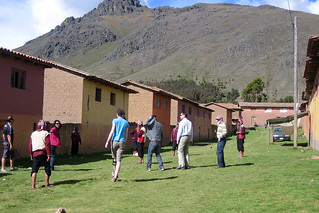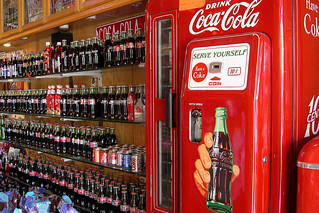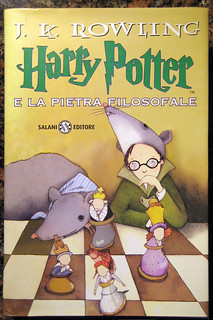

| Archive Blog Cast Forum RSS Books! Poll Results About Search Fan Art Podcast More Stuff Random |
|
Classic comic reruns every day
|
1 {photo of Me pushing a luggage trolley through the wall to Platform 9 3/4}
1 Caption: Cultural Absolutes
|
First (1) | Previous (3284) | Next (3286) || Latest Rerun (2888) |
Latest New (5380) First 5 | Previous 5 | Next 5 | Latest 5 Annotations theme: First | Previous | Next | Latest || First 5 | Previous 5 | Next 5 | Latest 5 This strip's permanent URL: http://www.irregularwebcomic.net/3285.html
Annotations off: turn on
Annotations on: turn off
|
 A father playing with kids. |
By "cultural absolute" I mean something invented by human culture that everyone knows about and will "get" if you make a passing reference to it in a casual conversation. Since I doubt there are any such things if we include everyone on Earth, I'm going to take a parochial approach and think about "Western civilisation" - which is itself a cultural absolute that most of us in Western civilisation will understand.
This morning as I start writing this, I'm reminded that there are very few things we can take for granted as cultural absolutes by everybody I see on my Twitter feed, Facebook, Google+, and so on wishing their fathers a happy Father's Day. They are people from all over the world. But the problem is, it isn't even close to Father's Day as far as I'm concerned. Father's Day, as everyone knows, is in September, not June.
Well, at least if you live in Australia it is. So while we all know what Father's Day is, we don't all have the same understanding of the second most important feature of Father's Day: when it is. It's not really a cultural absolute.
In fact, as in all things (more or less), there are degrees of absoluteness. I'm going to be saying "everybody* knows" a lot here, and I expect that to be read with the caveat that you can probably find a few exceptions somewhere, not as a statement of literal truth. With that out of the way, what are the closest things I can think of to cultural absolutes?
 Me playing soccer with a group of Peruvian weavers in the high Andes. |
Next on my list might be football, specifically Association football or soccer as it is known in many places. As much a fan as I am of cricket, I must admit that soccer is easily the more widespread sport. Mention football/soccer to anyone* in Western civilisation (and in fact throughout much more of the world than just that) and they will know what you're talking about. The may not like or be interested in the game, or have the foggiest about the offside rule, but they'll know what the game is.
Coca-Cola. Coca-Cola is everywhere, and is squeezed out as the top selling soft drink in precious few countries (one is Peru, where the local product Inca Kola is more popular; another is India). Okay, some of you may be saying, if Coke is a cultural absolute, then so is Pepsi. Not so. I understand that Pepsi has a following in the US and is considered a significant market presence. On the other hand, I only learnt this on my first trip to the US, when I was shocked to discover that some people actually drink Pepsi. In my entire life, I have never met any Australian who drinks Pepsi. I suppose some people must drink it, because in the drinks fridges of shops, amongst the thousands of cans and bottles of Coke, there's sometimes a can or two of Pepsi. I don't know who buys them... Maybe American tourists.
 Coca-Cola! |
And there are precious few of them. Pride and Prejudice? No. Although very popular, you can no doubt easily find many people unfamiliar with the story. Especially teenagers who haven't been forced to read the book at school yet. For something to be a cultural absolute, children have to know what it is when you mention it. It has to be so ubiquitous in our Western culture that kids are exposed to it because of how often it is referenced. (God, soccer, and Coca-Cola all qualify there.)
Dracula. Now that's getting better. Everyone knows what a vampire is, including kids. There's even a vampire on Sesame Street. That's the sort of cultural ubiquity I'm talking about. That only catch here is that Dracula specifically might be slightly less well known than the concept of vampires in general.
Sherlock Holmes maybe? James Bond? I think Dracula is a better bet, since I'm guessing he's better known in non-English-speaking cultures. And as we get into the 20th century it becomes harder to think of something that is widespread enough to be known throughout Western civilisation.
 Theseus slaying the Minotaur. |
(In contrast, something like Greek mythology or the works of Shakespeare, while influential and leaving their imprints all over idiomatic language and literary allusion, aren't nearly as well known. Ask people about the story of the Judgement of Paris, or the play within a play, and the story of how Yoda trained Luke, and I know which one more people will be familiar with.)
Star Wars arose in the 1970s, when western culture was just in the process of becoming global. These were the days when a film would do a sort of tour around the world, being released in the US first, then make its way to Australia (where I live) about six months later, and then on to other countries up to a year or perhaps more later. I don't remember seeing Star Wars in the cinema, though I'm pretty sure I did. What I do remember are the many lines of toys and other products associated with the film. I collected a bunch of those action figures, a school friend of mine had the Escape from the Death Star game. Star Wars was everywhere, remained so for the next six years until Return of the Jedi was released, and then never went away again.
I've met people who characterised Star Trek as "that show with the guy with the pointy ears", but everybody* knows who Darth Vader is. Star Wars has penetrated popular culture like no other work of fiction, and I've already spent an entire other annotation discussing it, so I'll continue with today's topic.
Since the 1970s and 80s, while western culture has become more global and homogeneous in one sense, in another it has fractured and become less homogeneous. Star Wars hit at the right time, when culture was global enough for one massive marketing campaign to reach every corner of Western civilisation, but not yet fractured enough to splinter into multiple niche markets. Now you can watch all the science fiction you like, if you want, or you can avoid it all just as easily. Our cultural world came together in the 1970s and 80s, but now it's been sliced along different axes. In 1960, two Australians who shared no interests had more in common with each other than either of them did with an American, or a German. Today, an Australian who likes Dr Who and Buffy and Dungeons & Dragons has more in common with a German SF fan/gamer than with an Australian surfer/motorsports fan who lives down the street.
 Star Wars really is everywhere. |
The exception is if something is designed for children. Marketing for children has to be broad enough to make their parents aware of it. Children haven't fully developed their tastes and interests to the point where they start walling off their genre niches. So you can still potentially reach all children, not just the science fiction fans. And if the piece of fiction is also interesting enough to captivate some adults, then that's about as good as you can do. And I can think of only one thing since Star Wars that has fit the bill. Harry Potter.
In the past decade or so, Harry Potter has been all over the place. In some people that triggers the "It's popular, therefore it sucks" reaction. But still, these people know about it and probably some of the details of the story and characters.
And so we get to the reason I thought of this topic. I recently started rereading the Harry Potter novels, and was reflecting on the fact that they (and the associated movies and merchandise) are so well known. If I had been a kid in the past decade, Harry Potter would have been my Star Wars. I have nephews of the right age, and yes, as far as I can determine by talking with them, this is essentially true. They know about Star Wars, but they know Harry Potter much better.
And then I got to wondering: what about kids who grew up during the 90s? What was their equivalent of Star Wars or Harry Potter?
I have absolutely no idea what it could be. I'm sitting here thinking right now... and nothing is coming into my head. If there was a cultural absolute phenomenon something like this during the 90s, then pretty much by definition I would be able to think of it immediately. I would know what it was, because it would be everywhere. (Possibly some of you are thinking, "Well, obviously it was <xxxxx>!" But the fact that a fairly culturally and media savvy person like me can't think of the same thing you're thinking of is a pretty heavy strike against whatever it is that you're thinking of!)
 Harry Potter in Italian. (I have no clue what the mouse hat is doing there.) |
I wonder how often these sorts of things will come around in the future. I suspect marketers are more savvy now and we might see a new cultural absolute phenomenon every decade or so from now on. Or maybe all the circumstances just need to be right, and it's not something you can pull out of a hat at will. I have no idea.
But I'll be looking out for the next one.
|
LEGO® is a registered trademark of the LEGO Group of companies,
which does not sponsor, authorise, or endorse this site. This material is presented in accordance with the LEGO® Fair Play Guidelines. |